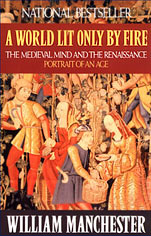Author William Manchester recently passed away which has prompted me to re-read some of his books. One favorite is A World Lit Only by Fire : The Medieval Mind and the Renaissance – Portrait of an Age. Manchester is often accused of being a “popular” historian, more focused on narrative than getting his facts straight. To these detractors I say, phooey. Unlike many history books which are the world’s best cure for insomnia, A World Lit Only By Fire is highly readable, entertaining, and enlightening. Manchester paints a grimly realistic picture of what life was like in the middle ages including the stench, the violence, and the pervasive Roman Catholic Church. He shows the seeds and the blossoming of the Renaissance – the combination of technology (printing press), brilliant enlightened minds (such as Erasmus and DaVinci), and Papal funding that brought about a full scale shift in the consciousness of the Western world.
The book is filled with colorful anecdotes describing the violence and punishments that were standard practice of the time.
Some men, in their search for absolution, suffered almost unendurable ordeals. The notorious Count Fulk the Black of Anjou, who crimes were legendary, finally realized that his immortal soul was in peril and, while miserable in the throes of conscience, begged for divine mercy. Count Fulk had sinned for twenty years. Among other things he had murdered his wife, though this charge had been dropped on the strength of his unsupported word that he had found her rutting behind a barn with a goatherd……Shackled, he was condemned to a triple Jerusalem pilgrimage: across most of France and Savoy, over the Alps, through the Papal States, Carinthia, Hungary, Bosnia, mountainous Serbia, Bulgaria, Constantinople, and the length of mountainous Anatolia, then down through modern Syria and Jordan to the holy city. In irons, his feet bleeding, he made this round trip three times – 15,300 miles – and the last time he was dragged through the streets on a hurdle while two well-muscled men lashed his naked back with bullwhips.
One of my favorite sections describes the complete moral degeneration of the Catholic popes, including the story of Lucrezia Borgia, daughter of Pople Alexander VI, who gave birth to his son. Manchester describes in detail how the selling of indulgences to fund Papal wars pushed Martin Luther over the edge and set off the Reformation. Many important characters of the time are explored including Erasmus, Thomas More, Henry VIII, Copernicus, and Martin Luther. A full quarter of the book is devoted to the story of Magellan and his voyage of circumnavigation. All this and the book is only 300 pages long. It’s an engaging introduction to that period of history.
